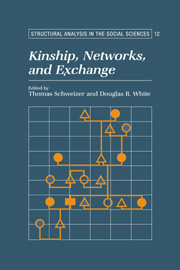Book contents
- Frontmatter
- Contents
- Preface
- List of contributors
- 1 Revitalizing the Study of Kinship and Exchange with Network Approaches
- I Representing Kinship Dynamics, Material Flow, and Economic Cooperation
- II Individual Embeddedness and the Larger Structure of Kinship and Exchange Networks
- III Marriage, Exchange, and Alliance: Reconsidering Bridewealth and Dowry
- IV Emergence, Development, and Transformation of Kin-Based Exchange Systems
- 12 Applications of the Minimum Spanning Tree Problem to Network Analysis
- 13 Local Rules and Global Structures: Models of Exclusive Straight Sister-Exchange
- 14 The Capacity and Constraints of Kinship in the Development of the Enga Tee Ceremonial Exchange Network (Papua New Guinea Highlands)
- 15 Between War and Peace: Gift Exchange and Commodity Barter in the Central and Fringe Highlands of Papua New Guinea
- Index
15 - Between War and Peace: Gift Exchange and Commodity Barter in the Central and Fringe Highlands of Papua New Guinea
Published online by Cambridge University Press: 05 November 2011
- Frontmatter
- Contents
- Preface
- List of contributors
- 1 Revitalizing the Study of Kinship and Exchange with Network Approaches
- I Representing Kinship Dynamics, Material Flow, and Economic Cooperation
- II Individual Embeddedness and the Larger Structure of Kinship and Exchange Networks
- III Marriage, Exchange, and Alliance: Reconsidering Bridewealth and Dowry
- IV Emergence, Development, and Transformation of Kin-Based Exchange Systems
- 12 Applications of the Minimum Spanning Tree Problem to Network Analysis
- 13 Local Rules and Global Structures: Models of Exclusive Straight Sister-Exchange
- 14 The Capacity and Constraints of Kinship in the Development of the Enga Tee Ceremonial Exchange Network (Papua New Guinea Highlands)
- 15 Between War and Peace: Gift Exchange and Commodity Barter in the Central and Fringe Highlands of Papua New Guinea
- Index
Summary
INTRODUCTION
In old Melanesia two different forms of exchange, ceremonial gift exchange and commodity barter, are to be found in a great variety. Anthropologists have often emphasized that both exchange forms are fundamentally contrastive and mutually exclusive (see, e.g., Gregory 1982). In the last couple of years, however, as the theoretical discourse in anthropology has been characterized by an increasing relaxation of the older theoretical frames of reference (Biersack 1991: 2), there have been some important attempts to reduce the exaggerated contrast between gift and commodity exchange (see, e.g., Appadurai 1986; Gell 1992; Valeri 1994). The present chapter is intended as another step into this direction. The aim of the paper is twofold: On the one hand some game-theoretical models will be delineated that I have used to point out both differences and similarities of the two exchange forms in the central Highlands of Papua New Guinea (Görlich 1992a, 1992b). On the other hand I will discuss to what extent these models can be used to understand and differentiate exchange processes of the Kobon people on the northern fringe of the Highlands of Papua New Guinea.
In the central Highlands societies ceremonial gift exchanges of pigs and shells play an important role in the politico-economic organization: They enable peaceful relationships and define the power positions of the actors. Beyond that a great variety of barter or trade transactions serve as an interconnecting link between different societies.
- Type
- Chapter
- Information
- Kinship, Networks, and Exchange , pp. 303 - 332Publisher: Cambridge University PressPrint publication year: 1998
- 4
- Cited by

